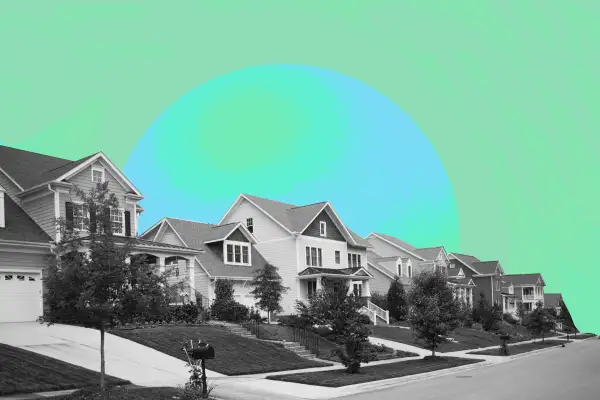Today's Best Mortgage and Refinance Rates: December 14, 2020 | Rates Down Again

Homes at high risk from natural disasters such as flooding and wildfires are seeing slower price growth than in lower-risk areas. However, don't expect bargains.
Meanwhile, mortgage rates ended last week on a downturn.
Today's Mortgage Rates
The average rate for a 30-year fixed-rate purchase mortgage was 3.092% on Friday. On Thursday, the average rate was 3.161%.
Money's mortgage rates include data from over 8,000 lenders across the United States and are updated daily. These rates include discount points and represent what a borrower with a 20% down payment and 700 credit scores — roughly the national average FICO score — would have been quoted.
| Mortgage Rates for December 14, 2020 |
| Loan type | Average Rate |
| 30-Year Fixed Loan | 3.092% |
| 15-Year Fixed Loan | 2.321% |
| 30-Year FHA Loan | 3.308% |
| 30-Year VA Loan | 3.401% |
| 30-Year Jumbo Loan | 3.529% |
Source: Money | Date: Dec. 11, 2020 | Rates assume a credit score of 700
How do I get the best mortgage rates?
Mortgage rates vary from state to state. On Friday, borrowers in Illinois were quoted the lowest mortgage rates — at 2.983%. People looking for mortgages in Colorado saw the highest average rate at 3.221%.
Nationwide, borrowers with the highest credit scores, 740 and above, were quoted rates averaging 2.825%, while those with credit of 620 or below were shown rates of 4.677%.
You may be able to negotiate a lower rate if you shop around or if you have other accounts with the lender. (Money's picks for the best mortgage lenders are here.) Currently, some lenders are hiking up advertised rates to keep demand in check, so you may be offered a lower rate if you reach out directly.
Freddie Mac's widely quoted Primary Mortgage Market Survey put rates at 2.71% with 0.7 points paid for the week ending December 10. Rates remained unchanged from last week's new record low. The mortgage purchaser's weekly survey reflects borrowers who put 20% down on conforming loans and have excellent credit.
Today's Mortgage Refinance Rates
Money's survey also shows that the offered rate for a 30-year refinance for someone with a 740 credit score was 3.26% on Friday. Last December, the average mortgage rate (including fees) was 3.88%.
| Refinance Rates for December 14, 2020 |
| Loan type | Average Rate |
| 30-Year Fixed Loan | 3.326% |
| 15-Year Fixed Loan | 2.61% |
| 30-Year FHA Loan | 3.654% |
| 30-Year VA Loan | 3.835% |
| 30-Year Jumbo Loan | 3.499% |
Source: Money | Date: Dec. 11, 2020 | Rates assume a credit score of 740
A homeowner with a $200,000 mortgage balance currently paying 3.88% on a 30-year could potentially cut their monthly payment from about $940 to about $872 by financing at the current lower rates. To determine if it's worth it to refinance your mortgage, also consider the closing fees you paid on your current mortgage, how much your new lender is charging and how long you have left on your loan term. (Our picks for the best lenders for refinancing are here).
What else is happening in the housing market today
In a five year study conducted by Realtor.com between 2014 and 2019, homes in flood-prone areas that were classified as high risk saw an average price growth per square foot of 25%. Homes at moderate risk saw growth of 29%. The lower price growth in high risk areas was most pronounced after especially destructive seasons.
"As the impacts of climate change and worsening natural disasters become more well-known, it's natural for home shoppers to take these factors into account when deciding the purchase price of a home, and tools that make information about these risks more available to buyers will help them make good choices," said Danielle Hale, chief economist for Realtor.com.
Fire-prone areas saw a similar pattern. Home prices for properties within a mile radius of high-risk fire zones saw 32% growth. That's compared to 35% growth for homes within the same counties but further away from high-risk areas.
"When buying a home in a flood or fire-prone area, home shoppers should budget for the added costs of home insurance, mitigation practices and potential losses, which can add to the total cost of ownership for the home," added Hale.
This year has been especially tough on the Gulf Coast as there have been three large hurricanes hitting the area in relatively quick succession. Western states like California and Oregon have seen record levels of destruction due to wildfires. The impact of these natural disasters on these housing markets will be felt well into the next year.
Bottom line:
Why This Winter Should Be One of the Best Ever for Home Sales
A Controversial New Fee Adds an Extra $1,400 to the Average Mortgage Refinance
Worried About Foreclosure? This Key Formula Can Tell You if You're at Risk
Rates are subject to change. All information provided here is accurate as of the publish date.
